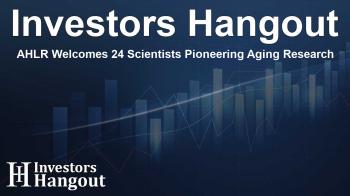AHLR Welcomes 24 Scientists Pioneering Aging Research

AHLR Inducts Leading Experts in Aging Research
The Academy for Health and Lifespan Research (AHLR) has welcomed 24 distinguished scientists to its roster, all recognized for their exceptional contributions to the field of aging and healthspan research. This expansion highlights the Academy's unwavering commitment to pioneering advancements that will significantly alter the landscape of aging research. The expertise of these new members will bolster the Academy's mission, placing a spotlight on effective strategies to promote longevity and enhance health during aging.
New Members and Their Contributions
These scientists, affiliated with prestigious institutions globally, bring a plethora of insights into the biological processes driving aging and methods of preventing age-related diseases. Each expert has spearheaded innovative research in crucial areas such as molecular biology, clinical geroscience, and genetics. Their combined efforts are instrumental in paving the way for healthier futures across generations. Let’s explore some of the notable new members:
1. Arne Akbar
Professor Akbar from University College London is a leading immunologist delving into how the immune system changes with age, particularly focusing on T cell biology and inflammation.
2. Uri Alon
Professor Alon, recognized for his work at the Weizmann Institute of Science, has reshaped the understanding of cellular aging through gene networks and biological robustness.
3. Andrzej Bartke
From the Southern Illinois School of Medicine, Dr. Bartke investigates the interplay between growth hormones and aging, with an emphasis on early life interventions to foster healthy aging.
4. Heike A. Bischoff-Ferrari
Professor Bischoff-Ferrari from the University of Basel leads the European Healthy Longevity trial, focusing on vitamin D and omega-3, connecting preventive medicine for the aging population with biological aging.
5. Anne Brunet
At Stanford University, Professor Brunet explores molecular mechanisms of aging and longevity, using a variety of model organisms to study lifespan regulation.
6. Rochelle Buffenstein
Dr. Buffenstein from the University of Illinois-Chicago is noted for her research on the naked mole-rat, investigating its extraordinary longevity and capacity to resist age-related diseases.
7. Haim Cohen
From Bar-Ilan University, Professor Cohen’s expertise lies in metabolic regulation and aging, particularly within sirtuin biology.
8. Sara Espinoza
Dr. Espinoza from Cedars Sinai Medical Center focuses on translational studies aimed at overcoming frailty and enhancing independence in older populations.
9. Toren Finkel
Dr. Finkel from the University of Pittsburgh examines oxidative stress, mitochondrial biology, and their roles in age-related diseases, making strides toward prolonging healthspan.
10. David Glass
At Regeneron Pharmaceuticals, Dr. Glass is a forerunner in biotech solutions targeted at mitigating muscle loss and metabolic decline during aging.
Building a Collective Vision
The addition of these esteemed scientists represents a strategic enhancement to AHLR's overarching vision. As stated by Dr. Nir Barzilai, the President of AHLR, the organization signifies the accelerating momentum within aging science. Bringing together diverse perspectives—ranging from cellular studies to public health policy—enables the Academy to strengthen their mission of extending healthspan and enhancing life quality.
About the Academy for Health and Lifespan Research
AHLR is a dedicated non-profit organization established to foster aging research, offer support to scientists, and promote collaboration within the scientific community. By engaging leading researchers, academic institutions, and pharmaceutical companies, the Academy strives to drive transformative breakthroughs in longevity research and make them accessible to everyone.
Frequently Asked Questions
What is the goal of the Academy for Health and Lifespan Research?
The Academy aims to advance aging research and foster collaboration among scientists, focusing on improving healthspan and quality of life.
Who are the recent members inducted into AHLR?
The Academy recently inducted 24 distinguished scientists recognized for their groundbreaking work in aging research.
How does the research conducted by these scientists affect aging?
The research focuses on various aspects of aging, including biological processes, disease prevention, and interventions to promote healthy longevity.
Why is the addition of these scientists important for AHLR?
The new members enhance the collective knowledge and expertise within AHLR, driving forward their mission in aging science.
What areas of research are these scientists focusing on?
Research areas include molecular biology, geriatrics, immunology, preventive medicine, and metabolic regulation related to aging.
About The Author
Contact Lucas Young privately here. Or send an email with ATTN: Lucas Young as the subject to contact@investorshangout.com.
About Investors Hangout
Investors Hangout is a leading online stock forum for financial discussion and learning, offering a wide range of free tools and resources. It draws in traders of all levels, who exchange market knowledge, investigate trading tactics, and keep an eye on industry developments in real time. Featuring financial articles, stock message boards, quotes, charts, company profiles, and live news updates. Through cooperative learning and a wealth of informational resources, it helps users from novices creating their first portfolios to experts honing their techniques. Join Investors Hangout today: https://investorshangout.com/
The content of this article is based on factual, publicly available information and does not represent legal, financial, or investment advice. Investors Hangout does not offer financial advice, and the author is not a licensed financial advisor. Consult a qualified advisor before making any financial or investment decisions based on this article. This article should not be considered advice to purchase, sell, or hold any securities or other investments. If any of the material provided here is inaccurate, please contact us for corrections.

